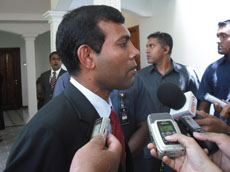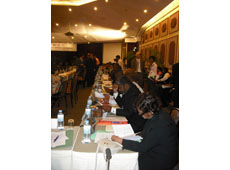The Cabinet has decided to open the opportunity for long line fishing of yellowfin tuna and bigeye tuna for Maldivian vessels after discussing a paper submitted by the Ministry of Fisheries and Agriculture during their meeting last Tuesday.
Cabinet claimed allowing long line fishing will improve the fisheries sector, which has worsened significantly since 2006.
Senior Research Officer at the Ministry of Fisheries and Agriculture, Hussein Sinan, said long line fishing is “far better for targeting yellowfin and bigeye tuna.”
Sinan said “there will be environmental impacts from any fishing method,” although there are “concerns for yellowfin stocks in the Indian Ocean.”
“There is a possibility the Indian Ocean Tuna Commission will introduce a quota system,” Sinan said, explaining that if they do implement a quota, the Maldives would have to regulate their catch more strictly.
He explained that the need to introduce long lining for yellowfin tuna was essential because it provides better income opportunities for fishermen.
“Look at the statistics. In 2005 the [Maldivian] fisheries industry caught 186,000 metric tonnes of fish. In 2008 it was 117,000 metric tonnes.”
Sinan added that long line fishing was “more sustainable” and it assured better quality of tuna for export.
“The pole-and-line process stresses the tuna, which causes them to produce lactic acid,” Sinan explained. “This makes it of lower quality.”
He said the Japanese market, one of the biggest fish consumers in the world, would only accept the highest quality tuna, and “for this reason long lining is better.”
“There are 22,000 fishermen in the Maldives,” Sinan said, “and the ministry wants more opportunities for them to catch fish. We need to protect their livelihoods.”
Sinan explained that larger vessels, those over 85 feet, “need to catch at least three metric tonnes a day, that is 3,000 kg of fish, otherwise their operation is working at a loss.”
He added that long line fishing vessels do not have to travel as far as pole and line vessels, lowering fuel costs.
Sinan said the government is planning a trial, which will decide whether or not long line fishing is beneficial for the Maldivian fisheries industry.
Environmental perspective
Minister for Housing, Transport and Environment, Mohamed Aslam, said long line fishing “is nothing new. It’s been going on for over ten years.”
He said “what’s happening now is the government has decided to terminate licenses for foreigners this April,” and only Maldivians on registered Maldivian vessels will be able to use long lining.
Allowing only Maldivians to use this method will make it “easier to regulate where they fish,” Aslam said, explaining that the vessels would be equipped with transponders and could be monitored and thus controlled.
He added that long line fishing would only be used to catch yellowfin and bigeye tuna, and traditional pole and line fishing would still be used for the country’s biggest tuna export, skipjack tuna.
Aslam said long lining for yellowfin tuna had been “sustainable so far” and “we only need to regulate it so stock doesn’t deplete.”
He noted that any banned by-catch, such as sharks, would “have to be thrown away. It will be wasted,” he said, adding that “every fishing method has potential of by-catch.”
Aslam thought the government’s initiative was “a good thing,” and noted that “long lining has never been prohibited for Maldivian fishermen. It has always been open,” but that most fishermen have not taken it up.
He noted that “in the current system, there are a lot of vessels that are losing money because there is not enough catch.”
Aslam said he hoped “the value of Maldivian fish will be raised” by international retailers such as Marks and Spencer in the UK, if it complies with sustainable methods.
“They buy fish from other fish-producing countries like Thailand, who don’t use pole and line fishing or dolphin friendly practices,” Aslam said.
Director of Environmental Protection and Research at the Environmental Protection Agency (EPA), Ibrahim Naeem, said “it is obvious that long line fishing will definitely catch some un-targeted fishes, like sharks and turtles.”
He said although “Indian Ocean tuna stock is still in good shape,” there were both good and bad implications to long lining.
He said the EPA considered by-catch to be the biggest environmental impact of long line fishing.
“The good side is yellowfin tuna is not fished well in the Maldives. There are a lot of tuna just hanging around in our deep seas,” Naeem said, noting that long line fishing would increase the catch.
Naeem said the government had made this decision because the fishing industry is very poor right now, “and fishermen are idle on islands right now, so they want to explore other avenues.”
He didn’t think the initiative would have any negative impacts on the fishing industry as a whole, but thought that “fishermen will not go for long lining if there is fish near the surface.”
Fishing industry’s perspective
President of the Fishermen’s Union Ibrahim Manik said “fishermen don’t want to do long line fishing, but they have to do it to survive.”
He said one of the reasons many fishermen were against long line fishing was because many dolphins and sharks are affected.
“Since the 2004 tsunami, many deep ocean currents have changed and many sharks get caught in the lines,” Manik said, adding that the shifting currents also meant fishing boats had to travel longer distances to find fish.
“Most boats are doing 2-3 trips a month. And they have to travel far.”
“Some fishermen are doing long line fishing because they are not catching enough fish,” Manik said, but noted that most fishermen want to continue using the traditional pole-and-line fishing.
Manik said about 70 percent of fishermen rely on skipjack tuna, and the remaining 30 percent on yellowfin tuna, but “fishermen are financially short. They cannot survive these days.”
Because of the financial situation of the fishing industry, Manik said fishermen are starting to look at catching reef fish and bigeye tuna.
He mentioned fishing vessels as another problem. “We have good vessels here in Maldives,” he said, “but many of them are not using the technology. Boats with new technology have the advantage.”
Manik said a change to long line fishing would even bring a problem with marketing. “Everything is labelled as pole and line-caught tuna, and now government is advertising long line fishing,” which will bring problems from export partners, many of whom only want to buy sustainably-caught tuna.
He also said financing was a major issue. “Fishermen are getting 70 percent leases from the bank [for their vessels], but they are not getting enough fish and not paying the bank back. There is no development bank and also a very high interest rate.”
Manik said the Fishermen’s Union had asked the government to extend the period to pay back the money to the bank to ten years, but their request was rejected.
“Our economy is down and living standards are going down day by day.”
“In Himandhoo side some dhonis are only catching three yellowfin tuna a day. Fishermen are just trying to do something to get money.”
He said although they understand the government is trying to do something beneficial for the fishing industry,“the government is spending so much on other things like sport, but they are not spending anything on fishermen.”
“We have to wait. We are waiting for the day the government will do something for fishermen.”
International market
Minivan News contacted Marks and Spencer (M&S) in the UK, which confirmed that Maldives is their main supplier of tuna.
A company spokesperson said M&S had “strict policies” on how the tuna it sells is caught, and would be looking into the issue.
A recent story published in the UK Telegraph newspaper on M&S’s tuna imports from the Maldives revealed how much emphasis the company places on pole-and-line fishing methods, which it considers to be more ‘eco-friendly’.

